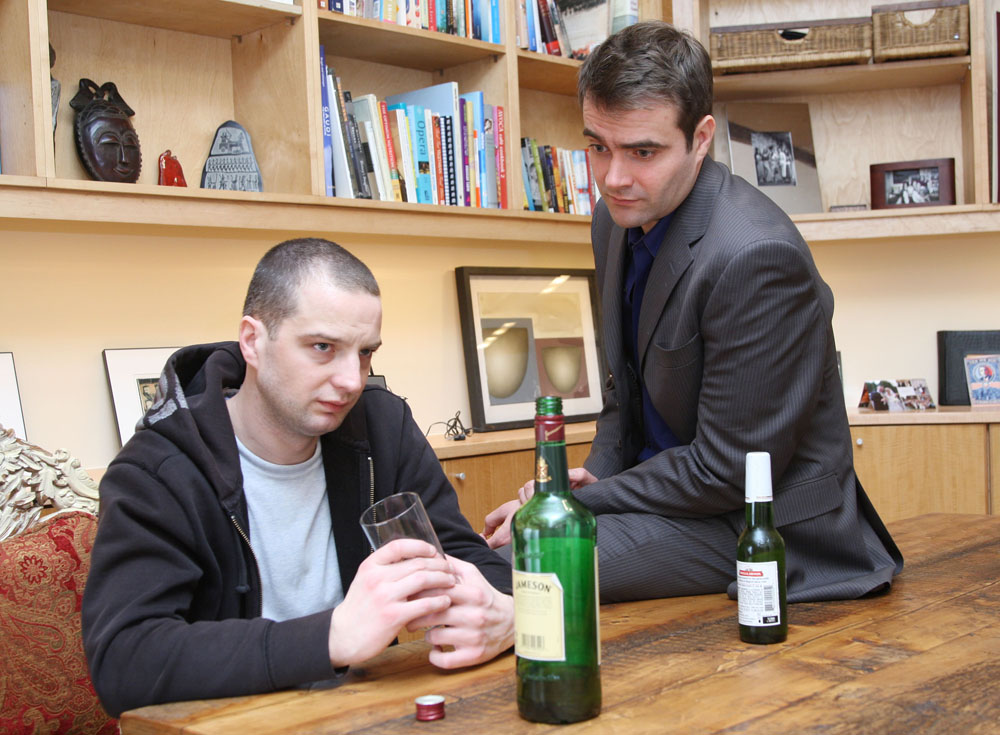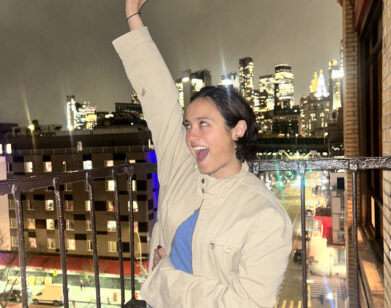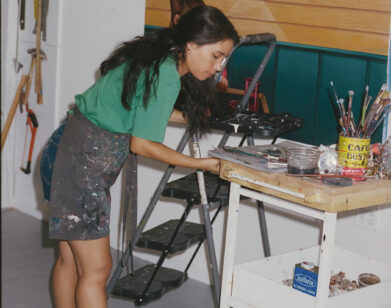Philip Ridley Looks Into Glass Houses

Leaves of Glass. Courtesy the Soho Theatre.
The U.S. premiere of a play by Brit artist and playwright Philip Ridley isn’t yet a cause célèbre, but it should be. Known across the pond for his provocative, often disturbing work, Ridley’s last play, Leaves of Glass, premiered at London’s Soho Theatre to acclaim in 2007, and now it’s opening for a limited run on New York’s Theater Row. Directed by Ludovica Villar-Hauser, it’s a haunting family drama about painful secrets and the havoc they subsequently wreak, it stars Tony-nominated Xanthe Elbrick and Euan Morton (he of Boy George in Taboo fame), along with Victor Villar-Hauser and Alexa Kelly.
Comparing himself to the infamous and popular British spread made from yeast extract, Ridley says: “My work is a Marmite kind of thing-love it or hate it. It’s not the hamburger mentality, the least offensive taste. They either get it with a passion or they don’t.” A Renaissance man of sorts—he’s also known for his award-winning children’s books, his photography, and his painting-Ridley is not the Serious Artiste persona his work might suggest. He was charming and even light-hearted when we discussed Leaves of Glass, during a break from editing his latest feature film, Heartless, starring Jim Sturgess.
Ariana Speyer: I saw Leaves of Glass in a preview last night and was very moved. In this family, there’s a dark secret that’s not acknowledged, and everyone has their own memory of it—the Rashomon effect.
Philip Ridley: There’s something that we experience the older we get: there’s no definitive truth about family life. I hear my mom talk about things that happened in my childhood and I think, ‘No, that’s not what happened at all!’ People revise, they edit out.
AS: And that was the catalyst for the play?
PR: I started to get obsessed by that idea, which has ricocheted through lots of projects. I centered the play on two brothers because, in talking to my brother about events, some quite trivial, some quite important, I realized that he’s got a completely different interpretation. It’s a lot like politicians talking to each other, talking in a code, a half oblique way. Or like listening to lawyers in a courtroom—no one is actually lying and no one is actually telling the whole of the truth. One of the hopes of the play is that the incident has a political agenda for what’s going on in the world.
AS: It’s a comment on the use of disinformation and propaganda in our lives lately, how the government has said one thing, while reality is entirely different.
PR: This whole political landscape that we’re in, the post-9/11 use of politics, has resulted in the biggest distrust of politicians since Watergate. This mantra of Bush and Blair, ‘We believe it and therefore it was true.’ That’s part of the argument going on between the brothers: ‘I’m not lying, I believe it to be the truth, so I’m justified.’
AS: It’s sort of like George Bush leaving office saying he did a fine job while almost everyone else would strongly disagree.
PR: In my heart I think there’s a connection between how we act in our families and our political life. If something is repeated enough it becomes the received wisdom. In recent history, the story was that 9/11 was because of Saddam Hussein, and yet we have irrefutable evidence that Saddam had nothing to do with what happened. It was a challenge for me to bring that into a very domestic situation, this political situation going on within this family.
AS: It’s funny to think of family members as mini-politicians, but that’s kind of what they are, jockeying for position, trying to get their agendas across.
PR: The play presents this nuclear family as a microcosm of lies and deceit and manipulation. This is not a new thing in theater, but it’s highlighted to the extent that there’s another agenda going on behind every line of dialogue. On the surface it’s one thing, but you realize that it’s code for another thing that each of the members is afraid of. And it’s frozen all of them, it’s petrified them into a frozen landscape. They’re like icebergs, only revealing one fifth of their total size. The whole play is a journey toward showing the other four fifths of the iceberg.
AS: And that revelation is cataclysmic.
PR: The effect in London was a gradual emotional tidal wave. The play is written in a deliberately cold and measured way for about two thirds of it. The characters are avoiding the eruption in a very clever way, because if they start there will be no stopping. In the last third the tidal wave begins to come in with an irresistible force. Many people in the audience were in tears then, that catharsis of emotion was almost overwhelming for them. The play holds back a lot until the last third, when everything starts to get stripped away. Then you begin to realize why it was held back, because it was devastating and only one of the brothers can survive it. That’s instinctively why they avoid talking about it.
AS: But there’s a twist during the denouement, when you realize that although you now know the truth, you still can’t make a moral judgment.
PR: Yes. Just when the audience thinks they have it morally sewn up, the real twist is yet to come. It’s the strange benediction that the mother gives to the whole proceedings. So though one brother did something terrible, he did it because he thought he was doing it for the right reasons, to save his mother. And there’s a logic in that-the brothers needed the mother to get along in the world.
AS: I thought the whole play was so psychologically astute, especially the ending. How did you gain all this insight into how people behave?
PR: I was raised sick as a child, and I still suffer from chronic asthma. I was sick in bed in an oxygen tent for sometimes weeks at a time. People think you can’t hear what’s being said when you’re in the tent, so grown-ups would talk as if I wasn’t in the room. I grew up observing the world around me, I had a master class in psychological insight by being a very sick child.
AS: Who do you count as your influences?
PR: Where do I start? I started as a painter, studying at St. Martins. Philip Guston was my favorite painter during my teen years. Hitchcock was my favorite filmmaker and probably still is. I’m just finishing editing a film that I shot last summer, and I’m like, ‘Oh there’s Hitchcock again.’
AS: That’s Heartless, right? It’s a thriller?
PR: It’s a psychological thriller that takes place in the East End of London with Jim Sturgess, Clemence Poesy, Eddie Marsan. It’s a lovely bunch of artists and it’s my first high-definition film. Hopefully it will have a screening at Cannes in May and then release it through the year after that.
AS: In these times, some people might think of theater as an extra, a luxury that has no relevance.
PR: Theater will be increasingly relevant as troubled times worsen. Theater gives something that very few other art forms can give-a community, a sense of going through a journey with other people. That has been the case since we were cave men and someone was drawing images on a wall and telling stories about it. The one thing that separates us from animals is that we tell each other stories, we try to find a ritual in stories.
AS: So what do you think the role of art is in a recession, or global collapse, or whatever this thing is?
PR: The role of theater is the role of all art, which is to make sense of the world. In a time of moral and economic questioning, the one thing you can rely on is that the artists can tell the truth. Politicians and priests might lie, but you can trust that the great artists are trying to tell you some kind of truth. In England that’s why more people would go to Tate Modern than go to a football game right now. When you see children in Palestine being killed and the politicians sitting back and letting it happen, where do you turn to? The only people who will still tell you a story that will make sense of it are artists, he says modestly. [Laughs]
Leaves of Glass plays from January 14 through February 8 at the Peter J. Sharp Theater, 416 W. 42nd St. Tickets available through ticketcentral.com.






